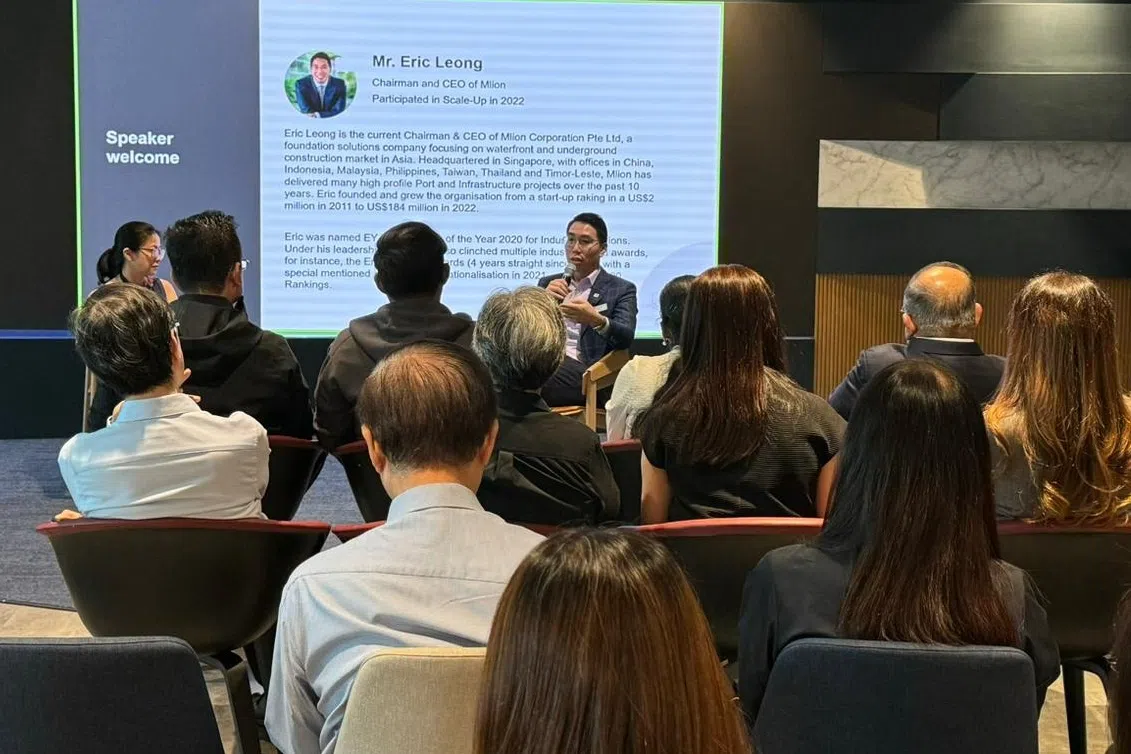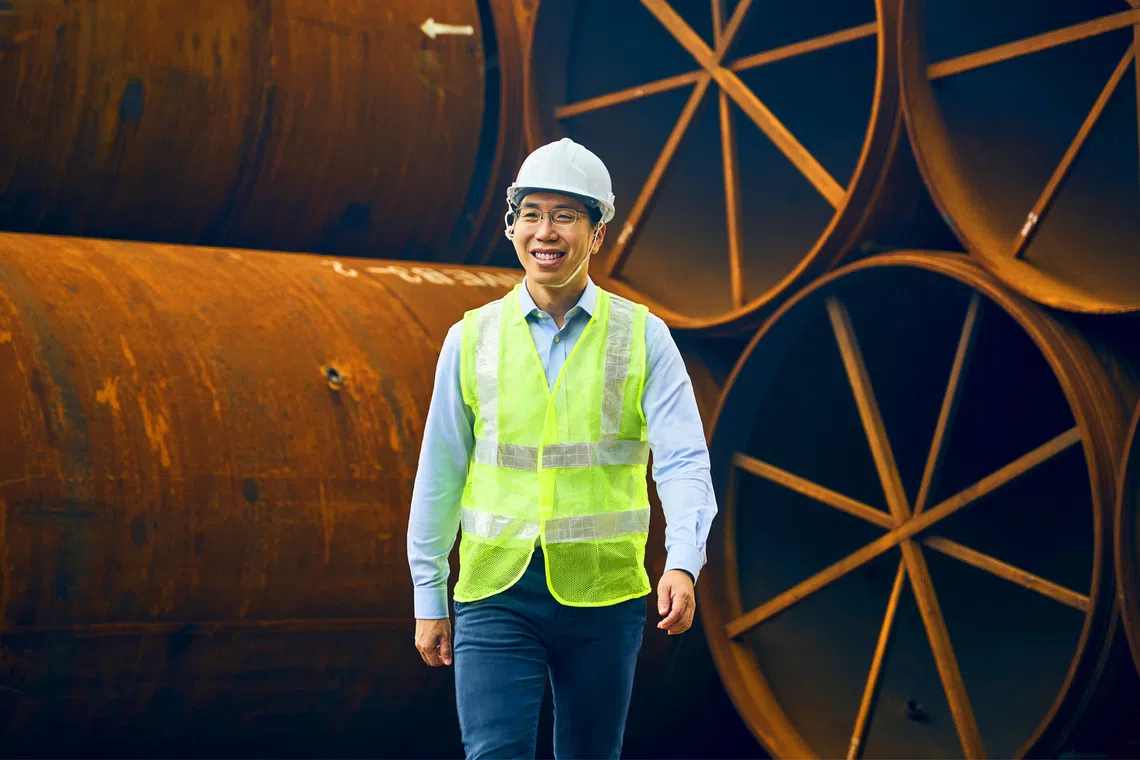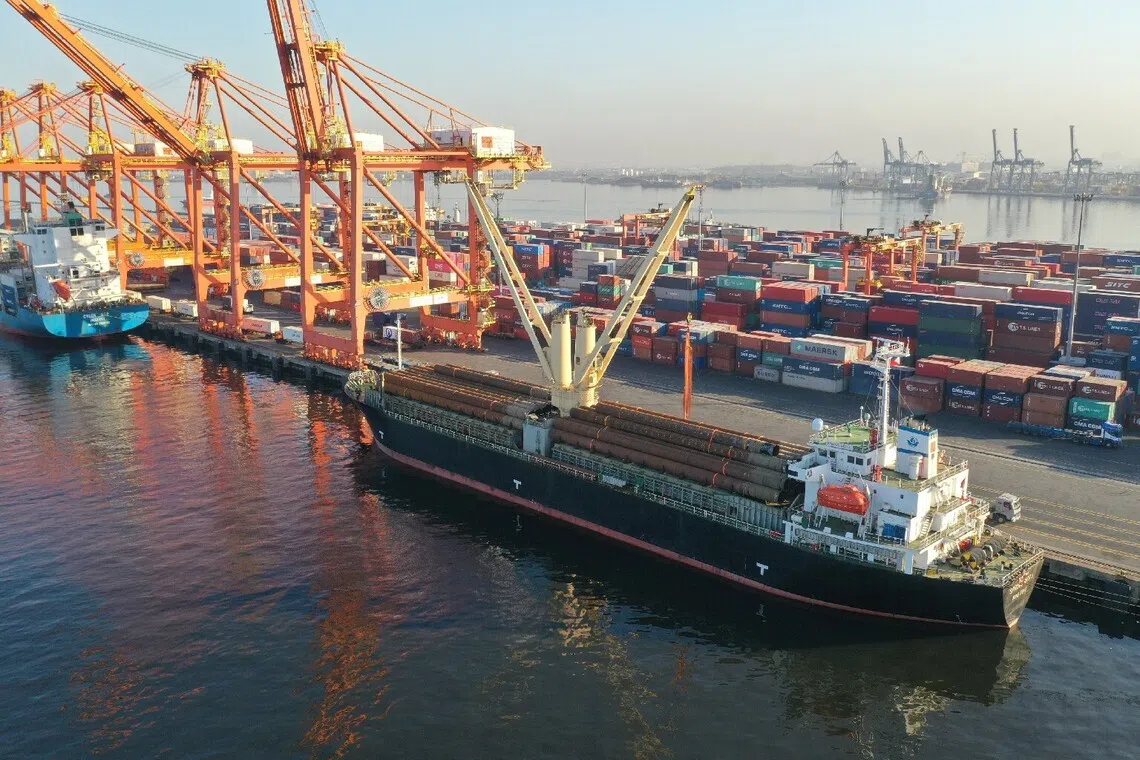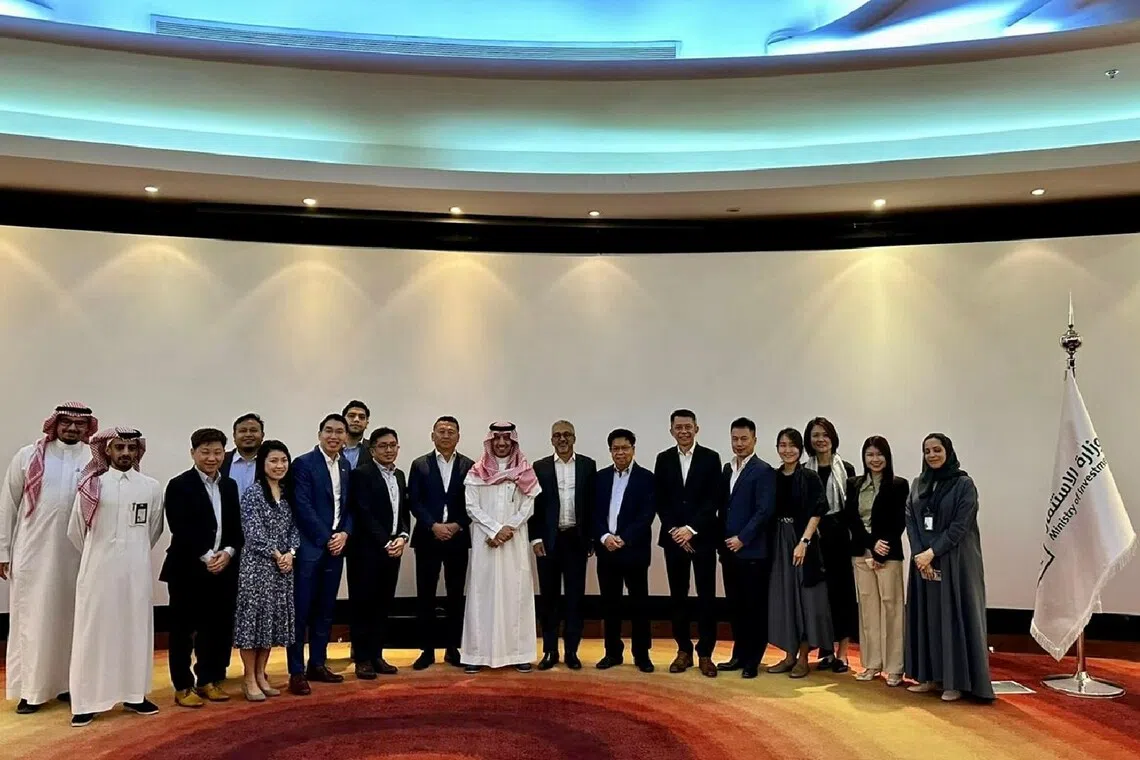Branded content
From Apple Marina Bay Sands to Philippine ports: How S’pore steel supplier built its way to become $306m regional giant
Tapping Enterprise Singapore’s networks and support, Mlion Corporation has transformed into a tech-enabled innovator, tracking steel components digitally while breaking into Middle Eastern and African markets

Chairman and chief executive officer Eric Leong (centre, pictured with wife Sarah Siew, who is chief of staff, and yard personnel Mathavan Subramani) built Mlion Corporation from $100,000 in 2011 to a multimillion-dollar steel distributor operating across nine markets.
PHOTO: SPH MEDIA
Follow topic:
The foundation steel holding up the Apple store in Marina Bay Sands and the North-South Corridor may be invisible to most people, but they demonstrate the great heights this home-grown company has achieved.
Those steel sheet piles – deep structural supports that hold back soil and water during large-scale excavations – came from Mlion (read as Merlion) Corporation that Mr Eric Leong co-founded with just $100,000 in 2011.
Then, steel sheet piles had been traded the same way for decades. The 40-year-old says: “Many steel players operated like a supermarket concept. They stocked a lot of steel and competed on low pricing.”
He decided to take a different approach – working with customers early in the projects, advising on materials and redesigning plans to cut costs and waste.
By the time those landmark projects were under construction in 2018, their strategy had already made the firm South-east Asia’s largest steel sheet pile supplier.
Today, Mlion has grown into a US$238 million (about S$306 million) company with offices across South-east Asia, the Middle East and Africa. Having gone global, the firm is no longer just a regional player and has even developed two breakthrough digital innovations.
Making new connections
Despite doing well in the first few years since its inception, Mr Leong knew he had to transform the business. At the time, the company operated mainly in Singapore and the Philippines, and faced pressure from much larger competitors in the steel industry.
In 2013, Mr Leong’s wife Sarah Siew left her teaching job to join the growing business. While Mr Leong focused on building customer relationships across the region, Ms Siew established the operational foundations that would support the company’s expansion.
“If we were going to put all our eggs in one basket, we wanted to make sure that we guard this basket,” she says about her decision to join Mlion.
Her move from education came as the firm’s projects in the Philippines were taking off. When the market began generating more than half of Mlion’s revenue in 2016, Mr Leong and Ms Siew relocated there for a year – with an 18-month-old and a newborn baby in tow.
“We decided that if more than half of our revenue is coming from a certain country, then we must be there,” explains Ms Siew.
Living closer to their customers helped the business grow. But it also underscored a bigger challenge: if Mlion did not scale up, it could not keep pace with its larger rivals.
“We knew that if we did not scale up, we would not have the ability to constantly compete with some of the bigger boys in the industry,” says Mr Leong.
The transformation began when he connected with Enterprise Singapore’s (EnterpriseSG) trade team in 2018. The agency offered insights on how Mlion’s products would fit in markets such as Malaysia, Indonesia, Thailand and Taiwan. It also connected the company with industry players such as global engineering, planning and management firm Meinhardt Group.
“Meinhardt was not a buyer of our steel,” says Mr Leong, “but they handle a lot of construction projects, and they could tell us immediately who to meet.”
EnterpriseSG also shared in-market contacts and provided regulatory guidance, which proved invaluable when setting up shop in unfamiliar markets.
“For example, the team in Indonesia connected us with port operators and projects,” Mr Leong explains. “They have also helped us look for companies that might be potential distributors or joint venture partners.”
The regional expansion was just the beginning of EnterpriseSG’s support. When Mlion reached about US$70 million (about S$90 million) annual revenue in 2021, it joined the agency’s Scale-Up programme, learning alongside nine other high-growth local companies to discover how to sharpen and expand their businesses exponentially.

Speaking at an Enterprise Singapore event, Mlion CEO Eric Leong shares insights how its Scale-Up programme has helped the company expand growth targets and develop breakthrough digital solutions.
PHOTO: MLION
“Other participants were saying they wanted to grow 10 times when we were only planning to grow three times!” says Mr Leong with a laugh. “The programme really challenges you to think bigger.”
The consultants worked closely with Mlion, questioning its business assumptions and scrutinising workflows, staffing and leadership. The intensive year-long process became the launchpad for two innovations that alleviated nagging industry problems.
A digital reselling platform for pre-owned steel materials, GoListid helps prevent wastage and reduce carbon emissions by preventing premature scrapping.
Meanwhile, GoTagID – a rugged RFID traceability solution inspired by retail tags on products – allows every steel piece to be tracked with a unique digital identity.

Yard personnel Mathavan Subramani, scanning Mlion’s GoTagID on a steel sheet pile. The ruggedised RFID tags survive extreme construction conditions and provide unique digital identification.
PHOTO: SPH MEDIA
EnterpriseSG also provided grants for the research and development of both solutions.
GoListid and GoTagID were officially launched in 2023. Since then, the company has tagged over 50,000 pieces of steel with GoTagID and is seizing opportunities to deploy the technology to adjacent sectors such as heavy machinery and sustainable steel.
GoTagID replaces identification stickers that easily fall off during construction by using RFID tags that survive extreme site conditions, including 200 deg C temperatures and saltwater exposure.
This eliminates costly cutting and testing to verify steep specifications while enabling applications that track machinery maintenance schedules and authenticate green steel.
Disrupting a traditional industry
The innovations reflect Mr Leong’s approach to business – one shaped by an unconventional path that began long before he entered the steel trade.
He first honed his entrepreneurial instincts at university by importing BMX bikes to fill a market gap in Singapore. The venture, which only lasted three years, taught him key lessons about cash flow and customer acquisition.

Mr Leong took an unconventional path to entrepreneurship, gaining experience across different industries before founding Mlion.
PHOTO: SPH MEDIA
His route to the steel sector was equally unexpected. Soon after graduation, he joined a fast-food chain as a management associate, learning restaurant operations and management from the ground up.
However, family pressure eventually led him to consider other industries. He joined a large steel conglomerate where he was initially slated for a Shanghai posting but was later retained in Singapore after proving his sales abilities by converting difficult prospects.
That success led to a bigger challenge: taking on the Philippines, where the firm had seen zero sales for three years. Though he spent less than a year there before leaving to start his own venture, the stint helped him build key relationships and understand the local market.
In Mlion’s early years, Mr Leong focused on waterfront projects in southern Philippines, where infrastructure demand was rising. He approached developers and contractors with a different pitch: direct supply and technical consultation instead of just product sales.

Mlion supplied 8,000 tonnes of steel pipes for Berth 7 of the Manila International Container Terminal, the flagship terminal of port operator International Container Terminal Services, Inc in the Philippines.
PHOTO: MLION
“Our strategy was that we did not want to go to the capital cities because they tend to have a lot of competition,” he says. “So, we went to smaller cities like Mindanao, Davao and Cebu, and started building our customer base there.
“When we showed clients that we could deliver directly instead of them buying from suppliers in Manila, it opened their eyes.”
The hard work paid off with successive project wins in the country. In 2019, Mlion clocked its largest order to date by supplying 27,000 tonnes of steel for Davao’s bulk water project.
By then, Mr Leong was ready to push beyond the Philippines and Singapore.
Growing beyond Asia
Fast forward to today, and the same philosophy of going where others will not has positioned Mlion for its next stage of growth. The company now operates across nine markets, including Singapore, the Philippines, Malaysia, Thailand and Taiwan.
Watch how Enterprise Singapore helps home-grown businesses expand overseas in this video.
Yet, even with breakthrough digital technologies and regional dominance, Mr Leong is focused on untapped markets.
That focus was not always so clear-cut. When EnterpriseSG invited him to join a business mission to Saudi Arabia in 2023, Mr Leong hesitated initially. The Scale-Up programme had already transformed his ambitions, but the Middle East was not on his radar.
In hindsight, he agreed that the visit was an eye-opener.
“We saw the amount of construction projects in Saudi Arabia and realised that we were missing out on something huge,” Mr Leong says. “It was not an easy market to go into but that has always been a hallmark of how we grew our company – we go to developing places where there is a lot of infrastructure to be built.”
Within a year, Mlion had established an office in Saudi Arabia and secured two pipeline projects in Dammam and Riyadh. EnterpriseSG is now supporting the company’s expansion into Africa, building on Mlion’s projects in Angola.
The global push gained further momentum when steel conglomerate Nippon Steel Trading Corporation – with a market cap of about S$30.9 billion – took a minority stake in Mlion in October 2024, laying the foundation for its next phase of expansion.

Ms Sarah Siew (fourth from left) and Mr Eric Leong (fifth from left) during Enterprise Singapore’s trade mission to Saudi Arabia in 2023, which led to Mlion establishing an office in the Middle East.
PHOTO: MLION
Reflecting on his company’s journey, Mr Leong identifies three factors that made the difference: embracing unfamiliar markets, partnering with the right organisations like EnterpriseSG and building trust with customers through consistent value delivery.
“We need to be more adventurous and go to places nobody wants to go,” he says. “When you provide customers with both trust and value, they will always support you and come back to you.”
With Mlion established across nine markets, Mr Leong’s vision now extends further.
“Our dream is to deliver innovative solutions that can shape the future of infrastructure and construction worldwide.”
This is part of a series showcasing how EnterpriseSG partners businesses in their defining moments of growth to achieve their dreams, by scaling, innovating, going global and building capabilities. Find out more here.
In partnership with


